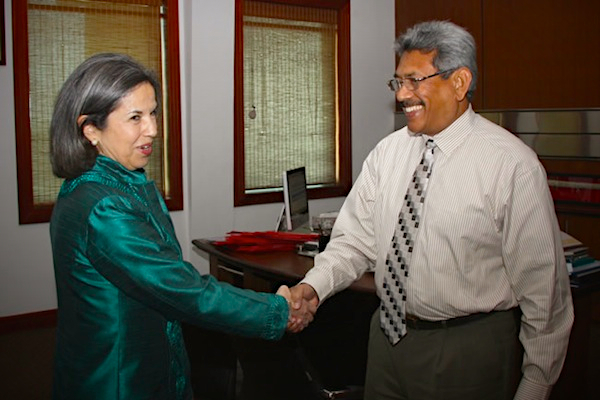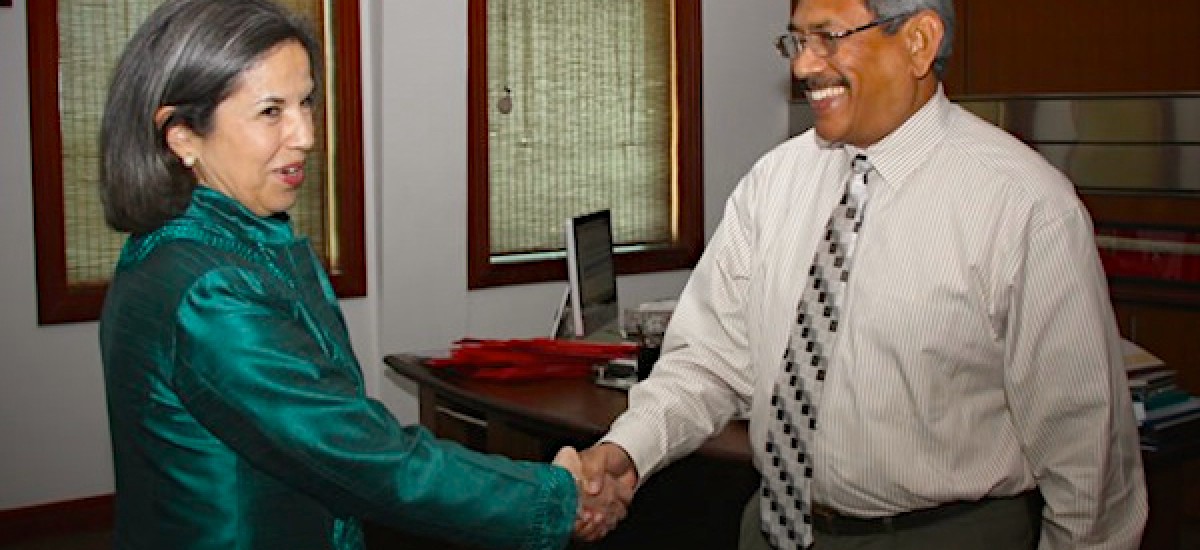
Maria Otero, US Under Secretary, Civilian Security, Democracy and Human Rights meets Gotabaya Rajapaksa, Secretary of Defence in February 2012. Photo courtesy Lanka Standard.
The year 2009 was when the Western group of States at the UN Human Rights Council (UNHRC) made a serious diplomatic blunder, by attempting to pass a resolution against Sri Lanka. The West missed the plot. This was just days after a bloody three decades long war had ended in Sri Lanka; just days after a group which was listed as a terrorist group in their own countries had been comprehensively defeated; at a time when they themselves had already begun a ‘War on Terror’; and soon after they were proven once again to be hypocritical defenders of human rights, given their convenient abstention from voting during the UNHRC Special Session on Israel. It was a serious diplomatic defeat for the West, a significant diplomatic victory for Sri Lanka and its allies.
Rise of ‘Eastphalia’
In addition, the victory attracted considerable attention through out the world. An interesting interpretation was offered by Sumit Ganguly, David P. Fidler (leading the Indiana University Centre on American and Global Security) and Sung Won Kim (of the Legal Affairs Division, the Ministry of Foreign Affairs of the Korean Republic). In a paper which argued that with the shift in power to the East, the centuries old ‘Westphalian’ concept is being slowly supplanted with a new ‘Eastphalian’ alternative, they stressed, inter alia: “… Sri Lanka’s ability to gain Chinese and Indian support in the [UNHRC] to defeat Western-backed resolutions critical of Colombo’s bloody crushing of the Tamil Tiger insurgency is perhaps also a sign of Eastphalia’s arrival.” (‘Eastphalia Rising?’, World Policy Journal, Summer, 2009). It was then a significant set-back, one that the US and its allies cannot forget. The UNHRC is a human rights debating forum; that we all know. But the UNHRC can be a useful forum too. The US knew that. The UNSG-Panel of Experts knew that too. Otherwise its members would not have written about the importance of revisiting the place in their Report.
Draft US resolution
Contrary to what the main Opposition-party, the UNP seems to think, what is happening in Geneva-2012 is as significant as the situation Sri Lanka faced in Geneva-2009. The vocabularies have slightly changed, the context is somewhat different (but a continuing one), but the country is faced against a Western block which is out to slowly change the outcome of 2009.
Through the draft resolution proposed by the US against Sri Lanka at the UN Human Rights Council (UNHRC) in Geneva, we are made to believe that the US wants the Sri Lankan Government to implement the recommendations contained in the Lessons Learnt and Reconciliation Commission (LLRC) Report, and to address serious allegations of violations of international law by conducting independent prosecutions. The US says that it is quite concerned about justice, reconciliation and peace in Sri Lanka. It appears that the US is playing the role of a concerned and benevolent father of the family of States in the international community.
Defeating US-hegemony
But the US, as we all know, is no Papa Bear. And there are a few problems about the politics of this proposed resolution. Yes, what is needed is the implementation of the LLRC-recommendations. What is unnecessary, however, is what India has correctly pointed out: a country-specific resolution to get it implemented soon after the Report was released. The proposed resolution is not one that attempts to place the US forces on Sri Lankan soil tomorrow. That we can understand. But there is more ‘arrogance’ and ‘insensitivity’ than ‘concern’ written all over the haste with which the US is demanding the Sri Lankan Government to produce a ‘comprehensive action plan’ as regards the implementation of the LLRC’s recommendations.
And yes, there has to be a critical discussion concerning some of the contents and the recommendations of the Report. But the US cannot set deadlines when it comes to the matter of implementing recommendations of the LLRC. That critical engagement about the contents of the LLRC Report (especially those aspects pertaining to human rights and humanitarian law) should, firstly, take place in a spirit of dialogue; and not by attempting to introduce a resolution that binds a Government to some international time-table, especially one set by a country which has no moral right to extract commitments from other countries on human rights protection.
The US, as critical legal scholar Martti Koskenniemi pointed out soon after the killing of Osama, is a “completely impossible international player.” It reduces small and weak States, in particular, to a state of helplessness in the world; for, its hypocrisy, its arrogance, its “impossibility” cannot be easily dealt with. But the UNHRC does provide opportunities when that impossibility can be met squarely. Like in 2009, Geneva-2012 provides another opportunity to tell the US where to get off. If then, the choice before Sri Lanka and many others at the UNHRC this March would be clear. Any moves made by the US, any resolutions introduced, would need to be defeated.
Correcting Sri Lanka’s arrogance
But then, there has to be some mechanism, some process, through which Sri Lanka needs to be told where to get off too. Uncritical, anti-Western ‘patriotism’ doesn’t take us very far. That should begin (and perhaps it has) with a stringent domestic, internal, critique of the Government’s policies. If so, the critique of the Left, the TNA and other political formations becomes extremely useful. Most important would be peoples-movements, the voices of its citizens. While internal pressure and demand for course-correction is essential, international pressure in the form of greater discussion and dialogue will prove useful (that is, without engaging in this hurried and absurd business of resolution-passing at the UNHRC to get recommendations of domestic reports implemented).
What is astounding in much of what the Sri Lankan Government is doing is that it acts as if there is absolutely no link between a country’s domestic policies and its foreign policy. That is a fundamental mistake. The political leadership is still unable to grasp that link in any serious manner; and ultimately, the burden falls on the diplomats who have to represent the country and defend its Government’s horrendous policies.
Sri Lanka has Ministers and Monitors in charge of, and overseeing, the subject of External Affairs. It has an educated Minister, but one who is either utterly unprincipled, inefficient or clearly lacking any influence in the matter of foreign policy making. There is no clear substitute either. All seem to be ‘Ministers’, ‘Monitors’ or ‘Special Representatives’ of some form or the other. As Sri Lanka’s former Ambassador to Geneva very correctly pointed out, too many cooks can certainly spoil the soup.
But there’s a further problem here. What is to be noted in that old saying, in relation to Sri Lanka, is not only the fact that there being too many ‘cooks’, but also the fact that they are dealing with one big ‘soup’. That seems to be what we are in, today; hence, the current complications and confusion, within and without. Whether Sri Lanka’s diplomats engage in their task of defending the country with any enthusiasm in this prevailing environment, or whether they really can be expected to do so, is a serious question.
Sri Lanka got an opportunity, soon after the war, to strengthen and perhaps build on the support base it was able to create in Geneva-2009. This would have happened (with very little complications and a lesser number of foreign trips) had there been more principled and responsible domestic policies adopted by its political leadership. Taking note of the changing global political environment is essential. Sri Lanka has to think far more broadly, have a clearer grasp of who its closest allies are, but while recognizing that the US/West, however hypocritical that block may be, cannot be ignored and dismissed with arrogance. The US, in particular, can always be critiqued on the issue of human rights protection and promotion. As even Fareed Zakaria admitted, the US has every kind of power but what it sorely lacks in this ‘Post-American’ world is legitimacy. But what needs to be remembered is that Sri Lanka lacks the same too, and as long as it does, Sri Lanka cannot be easily expected to play the role of the ‘innocent underdog.’
Sri Lankan goal: running away
What does Sri Lanka want to achieve in this ‘post-war’ phase of its history? What are its goals? How can State-sovereignty be used for better purposes, for the betterment of the people? These are fundamental questions that it needs to answer. A close observation suggests that we are going in circles. The same problems and issues come up, over and over again. Those problems that Sri Lanka promised would be addressed are still being improperly and inadequately addressed; from accountability, to human rights protection and power-sharing. To understand the sheer ridiculousness of the situation, one need not go that far. Sri Lanka has reached a stage where other countries are demanding the implementation of a Report handed over by a Commission appointed by its own Government; the LLRC. For example, very soon, there will be (as reported) another updated version of the Channel 4 video released to the public. And the same, stale, rhetoric will be dished out by the regime. What was amusing was this: even the LLRC wasn’t ready to but it.
Very soon, the Government would need to take serious note of its rottenness. It is today the popular argument that while national sovereignty ought to be defended staunchly, popular sovereignty of the people will decide what changes the internal political and social structure should undergo. Fair enough. The people will decide. But then, what the community of people within the country would do internally, the community of States might decide to do externally too; not by military intervention only, but through various other means. We can defend ourselves; but how strong that defence would be depends in turn on how strongly our friends and allies are ready to stand by us. For that, we need to take corrective measures. Running away is not an option today.
A final word from Kafka
From Kafka’s ‘The Departure’ comes a beautiful section:
At the gate he stopped me and asked: “Where is the master going?”
“I don’t know,” I said, “just out of here, just out of here. Out of here, nothing else, it’s the only way I can reach my goal.”
“So you know your goal?” he asked.
“Yes,” I replied, “I’ve just told you. Out of here – that’s my goal.”
Here. Geneva. March, 2012. Again, October, 2012. Again, 2013. And how did Kafka, Master Kafka, know about the goals of our leaders?

